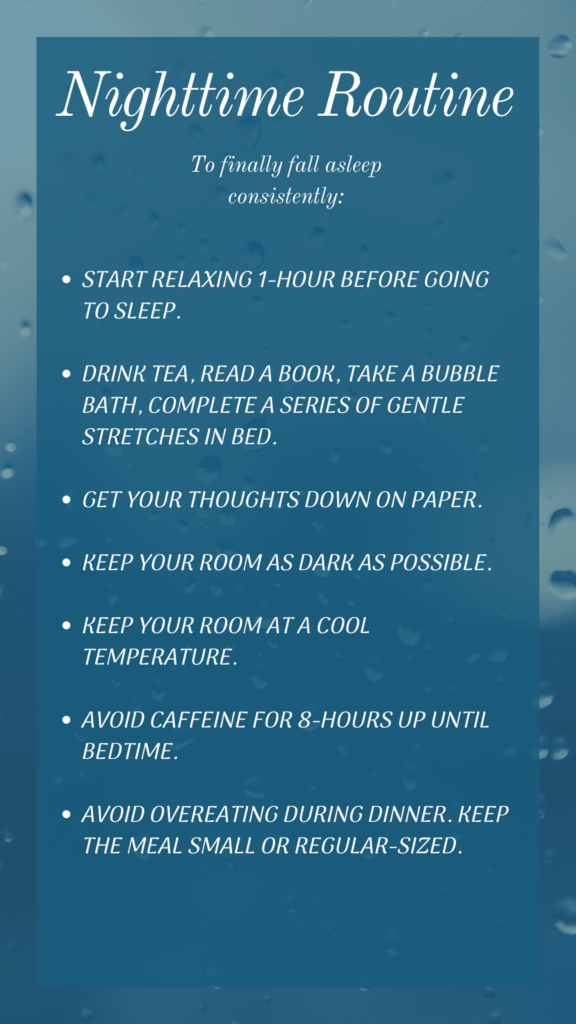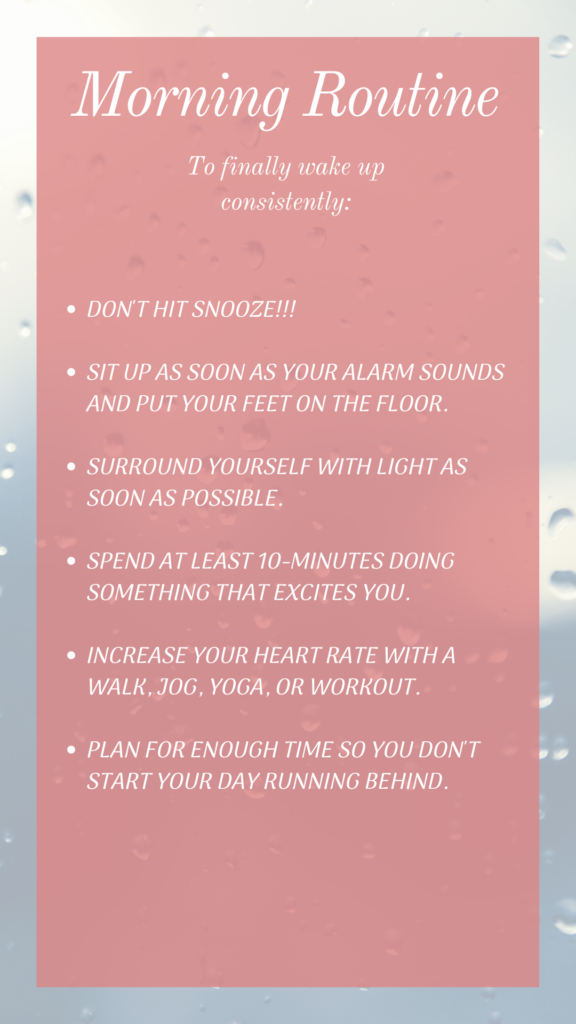Fall asleep, stay asleep, and wake up easier with these tips!
Are you running sub-optimally? Are you used to sleep deprivation without even realizing it? Don’t worry, you’re probably in the majority. Our culture prioritizes GOING, GOING, GOING to the point where people who only sleep 3 hours a night are envied! It’s no surprise that most of us are not getting enough sleep but it is shocking that so many people are so used to feeling sleep deprived that it just feels normal.
Feeling tired all day long isn’t normal. Feeling brain fog and cloudiness isn’t normal. The inability to concentrate and focus isn’t normal. If you’re used to feeling these things, I encourage you to honestly consider how differently you might experience the day if you woke up well-rested. And if you can’t even remember how it feels to be well-rested? You need this the most. Our cognitive function, memory, and mood are very dependent on the amount of sleep we get. We could all use benefits in these areas.
The first step is to acknowledge the point in the sleeping process that is most troubling for you: Are you unable to fall asleep? Unable to stay asleep? Is it difficult to wake up in the morning? Here’s the truth: We should be sleeping for 7-8 hours per night. And for those of you hitting the gym hard? You probably need a little more.
If sleep is a difficult area for you, I have two habit recommendations: create a nighttime routine and create a morning routine. Only choose one to start with, depending on your area of struggle. If you have trouble getting to bed on time, choose a nighttime routine to start with. If you are sleeping long enough but waking up is difficult, choose a morning routine to start with.
A nighttime routine is something we’re used to hearing when it’s associated with kids, but it’s actually useful for humans in general. The point of the routine is to create a habit that you practice nightly, which tells your body that it’s time to wind down and relax. Most of us already have some type of routine we follow before going to bed, but chances are, it wasn’t created strategically. It was probably built through unintentional habits, meaning, you get in a routine that was never tested and never challenged. It wasn’t intentional. But as you know, the habits we follow are up to us. We can change current habits and build new ones and around the area of sleep, habits are crucial. And if you’re not actively choosing the habits you follow, you’re probably unintentionally choosing to continue already ingrained habits that may not be helping you.
The point of a nighttime routine is to habitually tell your body when it’s time to relax. Just like building a habit to hydrate or eat veggies, building this type of routine will be difficult in the beginning, but it will make things infinitely easier for you in the long run. Right now, you may be trying to force yourself into sleep because your body or mind isn’t ready to shut off. If you build a routine that you practice consistently at the same time each night, your body will acclimate to your routine. In the beginning it may feel like you’re still trying to force it, but with repetition, your body and brain will catch up. And soon, your body and mind will naturally start to turn off at the right time for you to sleep for 8 full hours before your alarm goes off.
A solid nighttime routine starts at least 1 hour before you’re supposed to be asleep. Let’s break this down: If your alarm will go off at 6 am, and you’re planning to sleep for 8 hours, your nighttime routine would begin at 9 pm each evening. Instead of opting for time in front of the TV, your phone or your tablet, choose activities that will actually relax your mind and your eyes. Screen time right before bed is an easy way to have trouble falling asleep. This routine should include something that relaxes you (not including any electronics) and something that will allow you to clear your mind enough to fall asleep on time. Having a notebook by your bed to write down the things that may threaten to keep you awake is an easy way to ensure that you don’t forget about them in the morning. Even just writing down what you’re thinking can help to allow nagging thoughts to leave you alone. And finally, give yourself enough time to fall asleep! Allotting 20-30 minutes to fall asleep before you need to be sleeping is simply wise. Missing out on the last 30 minutes of sleep can be impactful; give yourself more than enough time.
A quick note about electronics: A lot of us would prefer to read (or journal) on our phones or tablets before bed. If skipping screen time is not an option for you, download an app that will adjust the brightness of your screen based on the time of day. You can Google ‘apps to manage screen brightness’ to find a ton of options that will change the lighting on your device depending on the time. So although screen time should be avoided before bed if possible, opt for a brightness-control app if you must use your phone or tablet.
In order to ensure that you stay asleep throughout the night, limit your fluids a couple hours before bed. Uninterrupted sleep is more important than quantity of sleep, so those pee-breaks during the night should be limited if at all possible! Your hydration efforts should mainly take place in the morning and throughout the afternoon, but once it’s within a few hours of bedtime, limit the water! Avoid caffeine for the 8 hours leading up to bedtime and don’t overeat during dinner! Our bodies must digest, but that process takes a lot of energy and can inhibit our quality of sleep. Keep your bedroom as dark as possible and sleeping in a cool temperature helps our bodies to stay asleep.
Now that you have the information you need to go to sleep on time, let’s talk about the morning. Building a morning routine may sound like an implausibility due to time constraints, but hear me out: Some of us have trouble getting out of bed in the morning because we’re not excited about the day ahead. This is not a healthy way to wake up in the morning (it’s not a fun way either). Allow yourself even just 10 minutes in the morning to do something you’re excited about: Work on a personal project, read a book, watch a motivational video, anything that will help you to look forward to something when you first open your eyes.
And when your alarm goes off in the morning, don’t you dare hit snooze! As soon as you hear your alarm, sit up and put your feet on the floor. This simple act helps to tell our bodies that sleep is over and the day is here! As soon as possible, surround yourself with light (the sun is optimal, but artificial light will do). While a nighttime routine should tell your body that it’s time to relax, a morning routine should tell your body that it’s time to start the day! If you have any opportunity to raise your heart rate first thing in the morning, do it! Even just a series of stretches can help to awaken your body and get your blood pumping. This makes a BIG difference in helping us to feel awake.
Sleep is necessary. The risks of long-term sleep deprivation are very real and very scary and if you aren’t feeling any negative effects of poor sleep, it’s only a matter of time until you do. Be honest with yourself to decide if it’s worthwhile to try even one new strategy to help you fall asleep faster, stay asleep longer, or wake up easier. Starting a habit or routine around sleep is something that you will use every single day. Your body will catch up to your habits as long as you stay consistent. Start with just one thing at a time and don’t add something new until it’s ingrained.
One last note: Sleep consistency matters. If falling asleep on time is a major challenge for you, I encourage you to keep your bedtime consistent for the entire week…yes, that means the weekends too. The easiest way to create a routine for your body is to do it every single day. Every. Single. Day.






